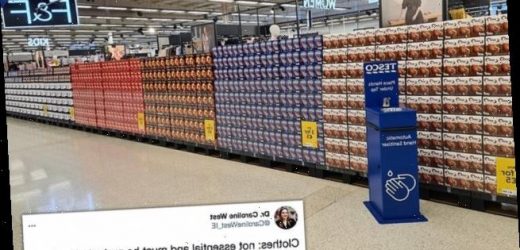The Great Wall of Chocolate: 100ft line of EASTER EGGS is used as a barrier to stop customers reaching ‘non-essential’ clothing at Tesco in Dublin
- Dr. Caroline West shared picture of Tesco superstore’s clothing section in Dublin
- Image revealed clothing in store was sectioned off with stacks of Easter eggs
- Dublin is in Level 5 lockdown which means only essential items may be sold
- ***Have YOU got similar photos? Email [email protected]***
Tesco has been ridiculed for putting up a ‘great wall of Easter eggs’ to block off non-essential clothing items at a store in Ireland.
Shopper Dr Caroline West shared a photo of the chocolate barrier measuring nine boxes high at a branch of the supermarket in Dublin, where stores can only sell essential goods under Ireland’s Level 5 lockdown rules.
The tweet racked up 4.6K retweets and 65.9K likes, with several social media users branding the policy ‘ridiculous’ and arguing that clothes are more necessary than chocolate eggs in January.
But Tesco insisted it was ‘adhering to government guidelines’ and stocking Easter Eggs to cater for customers who ‘prefer to stock up early or buy them over a period of time to spread the cost’.
A Tesco shopper in Dublin has criticised the supermarket for blocking off their clothing section with a huge wall of Easter eggs (pictured)
Dr. Caroline West, from Dublin, shared the picture on Twitter sparking a debate about what an essential item is
Sharing the image of the store, Dr. West wrote: ‘Clothes: not essential and must be protected by the Great Wall of Easter Eggs.’
‘People need clothes, how is chocolate important’, wrote one angry user.
While another tweeted: ‘So clothes not essential, but stuffing your face with chocolate is. They said obese people more likely to have problems with covid, gov puts healthy eating adverts out there, yet supermarkets don’t get the message.’
A third enraged shopper said: ‘Clothes are not essential but chocolate Easter eggs are….someone need to get their priorities straight.’
The tweet racked up 4.6K retweets and 65.9K likes, with several social media users branding the policy ‘ridiculous’ and insisting that clothes are more necessary than chocolate eggs in January
Irish guidance states that retailers with a mixed offering of goods, which have discrete spaces for essential and non-essential retail, should make arrangements for the separation of relevant areas.
In England, many have also expressed anger and confusion over what counts as an essential item amid the latest set of lockdown restrictions.
Essential retail includes food shops, supermarkets, pharmacies, garden centres, building merchants and suppliers of building products and off-licences, the Government’s official website states.
While florists, clothes stores and book shops have all been deemed non-essential and have been forced to close, those deemed essential, such as garden centres and pet stores, have stayed open.
The less-obvious retailers allowed to trade in person include dry cleaners, outdoor botanical gardens and cattle or farm equipment auctions – while every other kind of auction must shut.
Those caught breaking the rules – including gyms who refuse to shut – can be slapped with a £200 fine. This figure can double up to £6,400 for repeat offenders.
A Tesco Ireland spokesperson said: ‘The safety of our customers and colleagues remains our number one priority and we continue to adhere to public health guidelines.
‘We’re adhering to Government guidelines and have closed our F&F clothing and toys units across the country. We’re stocking the range of Easter eggs to cater for customers who prefer to stock up early or to buy them over a period of time to help spread the cost.’
Have YOU got similar photos? Email [email protected].
What is an ‘essential item’ in Irish Level 5 lockdown?
The only retailers which are allowed to open under Level 5 lockdown in Ireland are as followed:
1. Outlets selling food or beverages on a takeaway basis, or newspapers, whether on a retail or wholesale basis and whether in a non-specialised or specialised outlet.
2. Markets that, wholly or principally, offer food for sale.
3. Outlets selling products necessary for the essential upkeep and functioning of places of residence and businesses, whether on a retail or wholesale basis.
4. Pharmacies, chemists and retailers or wholesalers providing pharmaceuticals or pharmaceutical or dispensing services, whether on a retail or wholesale basis.
5. Outlets selling health, medical or orthopaedic goods in a specialised outlet, whether on a retail or wholesale basis.
6. Fuel service stations and heating fuel providers.
7. Outlets selling essential items for the health and welfare of animals (including animal feed and veterinary medicinal products, pet food, animal bedding and animal supplies), whether on a retail or wholesale basis.
8. Laundries and dry cleaners.
9. Banks, post offices and credit unions.
10. Outlets selling safety supplies (including work-wear apparel, footwear and personal protective equipment), whether on a retail or wholesale basis.
11. Hardware outlets, builders’ merchants and outlets that provide, whether on a retail or wholesale basis:
- Hardware products necessary for home and business maintenance or construction and development
- Sanitation and farm equipment
- Supplies and tools essential for farming or agriculture purposes
12. Outlets providing for the repair and maintenance of mechanically propelled vehicles or bicycles and any related facilities (including tyre sales and repairs).
13. The following outlets, insofar as they offer services on an emergency basis only:
- Outlets selling office products and services for businesses or for relevant persons working from their respective places of residence, whether on a retail or wholesale basis
- Outlets providing electrical, information and communications technology and telephone sales, repair and maintenance services for places of residence and businesses
14. Any other retail outlet that operates an online or other remote system of ordering goods for purposes of delivery only.
15. Outlets selling food or beverages whether on a retail or wholesale basis and whether in a non-specialised or specialised outlet:
16. Optician and optometrist outlets. Any retail parts of premises should not be open to general public for browsing.
17. Outlets providing hearing test services or selling hearing aids and appliances.
Source: Read Full Article












